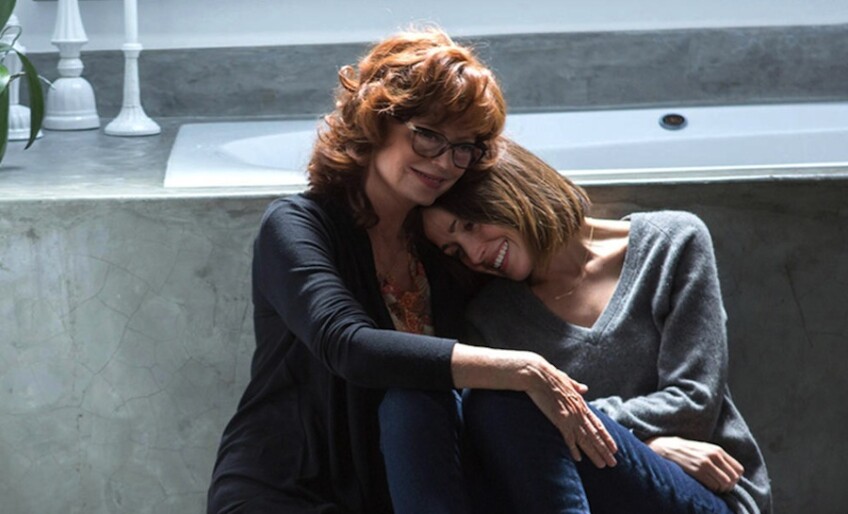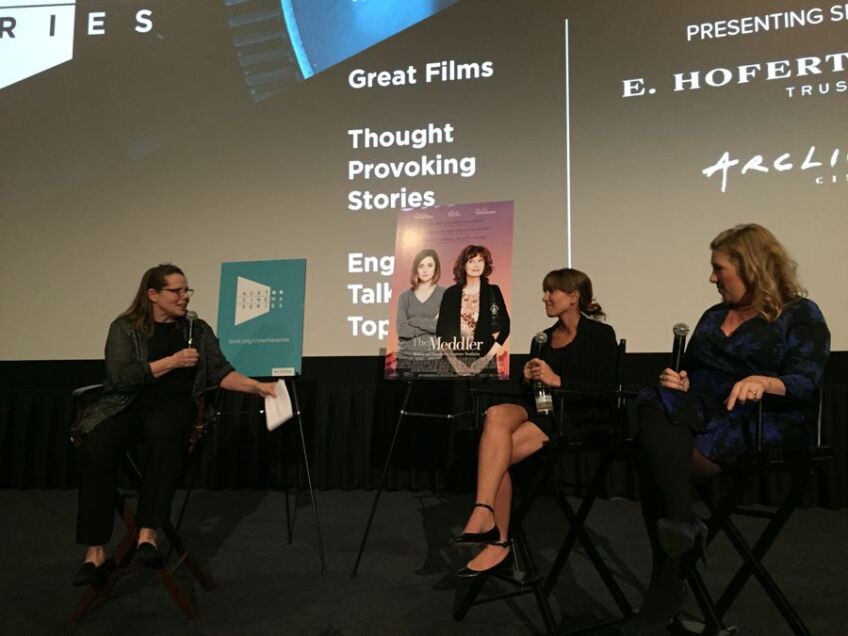"The Meddler" Filmmakers on Susan Sarandon, Beyonce, and the Grove


The KCET Cinema Series concluded its eight-week spring season at ArcLight Cinemas Sherman Oaks on April 12 with "The Meddler." The film stars Susan Sarandon as Marnie, who moves to Los Angeles after the death of her husband. In her new hometown, she discovers The Grove, becomes an Apple fan and gets a little too close to her daughter Lori, played by Rose Byrne. The film also stars J.K. Simmons and features Jerrod Carmichael, Michael McKean and Cecily Strong as the new people who enter Marnie's life in L.A.
Writer/director Lorene Scafaria and producer Joy Gorman Wettels, who also collaborated on Scafaria's directorial debut "Seeking a Friend for the End of the World," were on hand for a Q&A session following the film. Madelyn Hammond, president of Madelyn Hammond & Associates, filled in for KCET Cinema Series host Pete Hammond as moderator.
The spring season of the KCET Cinema Series was generously sponsored by the E. Hofert Dailey Trust and featured a mix of comedies and dramas over the course of eight weeks. Tickets for the KCET Cinema Series' summer season, which will take place at Santa Monica's Aero Theatre, will be on sale beginning April 21.
Below is an excerpt of Tuesday night's Q-and-A Session.
On the inspiration for "The Meddler" and getting Susan Sarandon for the lead role.
Lorene Scafaria: It was inspired by my mother, who moved from New Jersey to Los Angeles after my dad died. That was about six years ago. She moved to the Palazzo, right across the street from The Grove where she went all the time. She went to the Apple store and got a phone and just left me lots of messages and then I wrote the script right away, within the month. She moved out and, yeah,
It took a while before Susan was on board. I certainly worked on the script for a while, wrestling with some demons and reading it to my mom over the phone to get her approval.
I sent it cold to Susan's agent, yeah, just because I was sort of fed up with how hard it was to get this made.
Joy Gorman Wettels: It was a really tough one to get made and, for a long time, people told us, make it a two-hander. You'll never get the financing for a character study about just a woman in her 60s. One of the things that was great was when Lorene said she wanted to send it to Susan Sarandon, I said, you know her agent, Shani, is a friend of mine and she posts these messages from her mother on her Facebook page every day. She's going to be obsessed with this script. Within two days, she had read it and told us that she was sending it to Susan and we met with Susan a week later. She was obsessed with it.
On the reaction of Scafaria's mother upon finding out that Susan Sarandon was playing the character based on her.
LS: Oh my God, she was so excited. She was like, uh, Daddy would be so excited to be married to Susan Sarandon.
JGW: It helps that there are photoshopped photos throughout the entire movie of Susan's head on Lorene's parents photos from Lorene's childhood.
On securing financing for the film.
JGW: It was really hard at first to find financing. We did go to some financiers with just Susan and people were like, what a beautiful script, what a great fit for Susan, come back to us when you have it fully cast. Come back when you have your Lori and when you have your Zipper. it took a while. Because the Lori role is so beautiful, but she doesn't have to carry the movie, it felt like it took a little while longer than we wished for it to get to Rose, but she read it and fell in love with it and really understood how important that role was, even though the movie is Marnie's movie, which is great.
Once we had our whole cast together, we actually had quite a few financiers interested. We had about five options.
LS: Only one of them, really, could reach the budget.
JGW: That we wanted.
LS: Which is very low, but I think the floor for what you could film in Los Angeles
JGW: With no tax credit by the way.
LS: With just ambitious locations and things that seemed impossible at the time, Beyonce songs playing on a loop, things like that.
On pitching the film.
JGW: In terms of the pitch, per se, something that Lorene did that was, that should be in the DVD extras, is she shot the first five minutes, the voiceover, at the Grove with her real mother, who would say, "You know, I'm not an actress."
LS: She was so freaked out, but we didn't even have permission from the Grove, so I told her, don't worry, we're going to be really tucked away and hidden. You just have to walk around like you usually do, but it's so funny how you tell somebody who is not used to acting, just smile, have a good time, like how you do when you go to the Grove and you're happy. It really worked.
JGW: It helped sell the movie. It even helped me in understanding how you're going to shoot the Grove, when I'm thinking that this is probably some hundred thousand dollar a day location and we don't have tax credit. It was such a terrific selling tool. Also, it made you fall in love with the woman on whom this character is based. I think it really helped Susan understand her character as well. When we did it in three hours.
LS: When Susan saw it, she said, this is everything. She just wanted to wear my mother's tops, which she does, and carry her purse.

On working with The Grove as a major location for the film.
JGW: They also underwrote a premiere tomorrow night at the Grove which is really generous and lovely, but Lorene writes the most charismatic, passionate, beautiful love letters when she wants something and its part of the vision of her movie. A combination of, I think, Lorene explaining this beautiful true story and how much the Grove really does mean to her mother and the smart marketing opportunity the Grove could have when Susan Sarandon is obsessed with a mall is very helpful to them.
On getting permission to use Beyonce's song, "I Was Here," in the film.
JGW: Before the movie was really fully financed, we went after the Grove. We went after Apple and we went after "I Was Here," just knowing those were huge financial pieces that were crucial to the story. I'm lucky enough to be friends with an incredible woman who is a partner at ICM, who is Beyonce's agent of 20 years, and she just fell in love with the script. She's a woman who is very close to her mother. Beyonce is very close to her mother. Diane Warren is very close to her mother. So, another letter from Lorene Scafaria. I dare you to say no.
LS: It said, Dear Mrs. Carter. I felt very silly writing it, but I…
I told her, it really was on a loop in my mother's car. She thought of it as my father's song to a point where, when we were trying to figure out what the quote would be on his headstone, she was like, "I've been listening to the best Beyonce song."
I was like, I don't know. He only listened to Sinatra. It was the only CD he had. It kind of seems weird, but, she thought of it as his song because he was an immigrant and it's about amounting to so much more than you ever thought was possible in life. So, I told her, "Well, it's your song. Obviously, it's your song." And we'll put Sinatra on his.
On Lorene Scafaria and Joy Gorman Wettels friendship and working relationship.
LS: We were friends first. Then Joy was my manager for a while.
JGW: I think our friendship, we're both Italian from the tri-state area. My mother, when she was alive, called 100 times a day. She passed before texting was invented, unfortunately, but she did send emails in all caps.
While we were developing "Seeking a Friend" was when Lorene's dad, Joe, who I also knew and loved very much passed away. I think Lorene's work is so personal and so lyrical and so poetic that I think that I'm so protective and in love with her words that it makes me a good partner because if I can't find the money to deliver the vision of something that she wrote, it just seems crazy to me. There's no other option because my love for her as a person comes first and she only writes who she is. She doesn't write phony stuff.
LS: Just being in the trenches this whole time has been, it's immeasurable, the amount of help. It's not just a friend. Being friends really helps because you can be honest and you can be desperate and say you have to help me fight this battle. This is the one. I'm sure I said that 5,000 times. This is the one battle we have to fight.
My mother and Joy have a special relationship. My mother did offer to pay for Joy's wedding.
JGW: I didn't follow through on it, but I did kind of, I don't know, I thought about it. We talked about it a lot. She has a lot of fun… She's still threatening to throw me a wedding. I keep telling her I have to lose my baby weight. She's like, "The baby's four."
On the film's title.
LS: It was absolutely always called "The Meddler." I think we thought about changing it because we didn't want people to get the wrong idea of a negative connotation for it or anything like that, but I think it just sets up, again, what the movie is trying to do, which is peel back the layers of what a meddler is and say this isn't it, hopefully, this isn't that kind of movie.
JGW: The hope is that it redefines the word and makes it, your mother is meddling because loves you and she misses you and she loves you. It doesn't have to be so negative.
On J.K. Simmons as Zipper, Marnie's love interest.
LS: That was all him. We talked about Zipper as this California cowboy and I mean, it is easy to go to a Sam Elliot place.
JGW: The mustache was even all him. That was his idea.
LS: There was a lot of talk about whether or not he was going to have a mustache. Ultimately, they just all do. That was his choice. We certainly discussed things and everything. That was something I, I enjoyed watching him. I guess what I really enjoyed is that Susan Sarandon is playing the main character and then J.K. Simmons gets to play with the character. It's not just this wacky lead and all these straight men around her. I kind of like the idea that he also gets to put on this role and he's playing this West Coast guy and she's this East Coast girl. Which she is. He's a California guy.